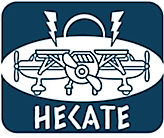The use of hybrid-electric propulsion systems will increase electrical power from hundreds of kilowatts in today's aircraft to megawatts in the aircraft of tomorrow. Collins has considerable experience in supplying electric power systems to some of the world's most advanced aircraft, and its specialists are currently working on next-generation, low-carbon footprint technologies that are an integral component of 'sustainable flight'.
At Lodz University of Technology, the project is coordinated by is dr Aleksandra Ziemińska-Stolarska, Faculty of Process Engineering and Environmental Protection. She thus spoke about the task she is in charge of ‘Our goal is to to prepare a carbon footprint analysis of the technologies developed in the project. This is yet another European project in which LCA (Life Cycle Assessment) methodology is used to identify potential environmental hazards that the use of new materials and modern production technologies may result in’.
The first meeting of the consortium partners, kicking off the 3-year project, was held in Cork, Ireland, on January 23-24 2023.
To find out more about the project please visit the website HECATE

